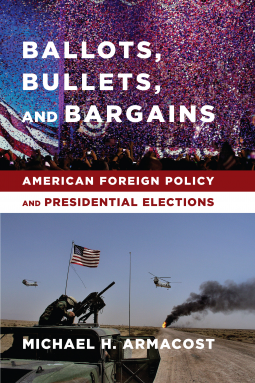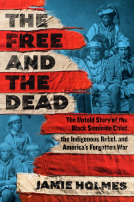
Ballots, Bullets, and Bargains
American Foreign Policy and Presidential Elections
by Michael H. Armacost
This title was previously available on NetGalley and is now archived.
Send NetGalley books directly to your Kindle or Kindle app
1
To read on a Kindle or Kindle app, please add kindle@netgalley.com as an approved email address to receive files in your Amazon account. Click here for step-by-step instructions.
2
Also find your Kindle email address within your Amazon account, and enter it here.
Pub Date Aug 04 2015 | Archive Date Sep 15 2015
Description
Drawing on twenty-four years of experience in government, Michael H. Armacost sheds light on how the presidential nomination battle impels candidates to accommodate the foreign policy DNA of the party faithful and may force an incumbent to undertake wholesale policy adjustments to fend off an intra-party nomination challenge. Even the prospect of a primary can prod a chief executive to fix long-neglected problems, duck intractable policy dilemmas, or settle for modest course corrections, underscoring both the virtues and the shortcomings of the U.S. presidential election system in influencing the management of foreign challenges.
Armacost begins with the quest for the presidential nomination and then moves through the general election campaign, the ten-week transition period between Election Day and Inauguration Day, and the early months of a new administration. He notes that campaigns rarely illuminate the tough strategic choices that the leader of the nation must make, and he provides rare insight into the challenge of aligning the roles of an outgoing incumbent (who retains formal authority despite ebbing power) and an incoming president (who performs no formal duties though possesses a fresh political mandate). He pays particular attention to the pressure for new presidents to act boldly abroad, even before a national security team is in place, decision-making procedures are set, or policy priorities are established. He concludes with recommendations for reforming the electoral system while preserving its distinct character.
Michael H. Armacost is the Shorenstein Distinguished Fellow at Stanford University’s Walter H. Shorenstein Asia-Pacific Research Center. He has served in senior positions at the State Department, the Defense Department, and the National Security Council Staff, and was president of the Brookings Institution from 1995 to 2002. He has received the President’s Distinguished Service Award, the Defense Department’s Distinguished Civilian Service Award, the Secretary of State’s Distinguished Service Award, and the Japanese government’s Grand Cordon of the Order of the Rising Sun. He is the author of Friends or Rivals? The Insider's Account of U.S.–Japan Relations and The Politics of Weapons Innovation: The Thor-Jupiter Controversy.
Advance Praise
Available Editions
| EDITION | Hardcover |
| ISBN | 9780231169929 |
| PRICE | $35.00 (USD) |
Average rating from 4 members
Featured Reviews
 Stefan F, Reviewer
Stefan F, Reviewer
BALLOT, BULLETS, AND BARGAINS is an interesting examination of how American foreign policy preferences can shift and affect the presidential election.
For someone who has been studying American politics (foreign and domestic policy, and how they intersect) for many years, Armacost's book offers plenty of food for thought. Well researched, well presented, and well written. An interesting read.
Readers who liked this book also liked:
Scott Michael LeRette
Biographies & Memoirs, Christian, Parenting, Families, Relationships


















